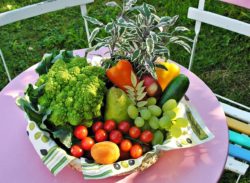
Store fruits and vegetables properly at home. Do you feel buying groceries from the market now and then, correctly storing them, is a big deal?
Are you wasting food because it ripens-then rots-faster than you can eat it? Storing food the right way can make all the difference.
Have you thought of running groceries for a long time in your pantry and refrigerator, which saves you a lot of money?
I like to save all my groceries for one or two weeks. Ya, you must be familiar with this weekly grocery shopping and storing.
Why is it so important to learn how to clean and store fruits and veggies?
As a busy mom, storing fruits and vegetables really works for me, and I don’t want to run if my cooking is not in my pantry.
It’s the cooking disaster that happened to me when I was not bothered about tracking my pantry or refrigerator. Before I discovered the pantry inventory chart/ refrigerator inventory chart for my groceries, it was a big deal for me.
Moreover, eating a diet rich in fruits and vegetables can lower your risk of many health conditions, including high blood pressure, heart disease, stroke, and certain kinds of cancers.
But if they’re not handled properly, fruits and veggies can also become a source of food-borne pathogens. If they’re not stored correctly, their taste, texture, and appearance can also suffer.
What’s the best time to wash your produce?

Well, if you’re super-efficient and very good at drying, you can wash your produce as soon as you get it home and store fruits and vegetables properly. But that’s not practical for most people. Just before you plan to use it is the best time.
If you’re planning for a party and don’t want to be stuck washing while your guests mingle, it’s fair to wash ahead of time. Just remember, excess moisture is the enemy of fresh fruits and vegetables. Make sure your product is dry before you store it.

Free Printable pdf download: Where to store fruits and vegetables?
Dry Storage
Certain types of produce are best left out of your refrigerator and freezer. Instead, they should be stored in a cool dry place.
Vegetables
- Place potatoes, onions, tomatoes, shallots, unpeeled garlic, lemon on your countertop.
- Tomatoes may lose flavour and nutrients when you refrigerate them. They can also develop an undesirable texture.
- Don’t place potatoes with onions. Keep an apple with potatoes to stop root growth.
Fruits
- Keep apples separate from your other fruits. Apples give off ethylene gas, which causes other foods to decay more quickly.
- Avoid separating bananas before you plan to eat them. They stay fresh longer when kept in a bunch.
- Once wrapped, wrap the tip of each banana with plastic film for long-lasting.
Spring Onion
- Life spam of spring onions can triple by storing them in a jar of water on your countertop. Strip them as you needed. The tops will keep growing.
In the Refrigerator
Typically, your refrigerator should be kept at around 34°F. Vegetables are best to store in the crisper section of your refrigerator.
This section consists of the drawer or drawers located at the bottom of most refrigerators. Crispers usually have their dedicated humidity controls.
Whole fruits generally don’t need to be refrigerated. However, refrigeration slows down their ripening process. Once you wash and cut fruit, you should always store it in your refrigerator or freezer. Refrigerating them can help them stay fresh for longer.
If possible, store vegetables at the temperature and humidity where they do best.
Green Leaf Vegetables
Firstly clean green leafy vegetables thoroughly, wipe them, and put them in a zipper-lock with a clean towel or paper towels that will absorb excess moisture and keep them fresh.
Mushroom

Some vegetables like a humid environment, whereas mushrooms fare better where it’s dry. Make mushrooms last longer by storing them in brown bags in your fridge, and the paper will absorb any excess water, preventing it from reaching your mushrooms.
Curry Leaves

Image by Elenza Photography from Pixabay
- Remove the curry leaves from the stem, wash, and pat gently.
- Arrange them in a large steel plate and cover them with seive.
- You can keep them in direct sun for 2-3 days, or room temperature can do the job.
- Once they become dry and crisp, store them in an airtight container and store them in the fridge.
Chopped vegetables and fruits
- Meal prep chopped veggies and fruits can be kept in a suitable food container.
- If you have used half of any vegetable, don’t keep it simple. Take a food-grade plastic storage film to secure the open end before tossing it in the fridge.
Grapes and berries
- Plastic bags with tiny vents help to keep them fresh longer by releasing moisture.
- Berries can long last by 30% vinegar solutions for few minutes and wash them using tap water.
Why you need to keep your fridge clean?

A bit of carrot dryness is bearable, but when fluff starts to appear, there’s no salvaging them. To stop fruit and vegetables from going moldy, make sure your fridge is clean.
There’s no need to disinfect every day entirely, but once a month, when it’s more-or-less empty before your weekly shop, wipe it down with hot, soapy water. In the meantime, wipe up spills and splashes.
A quick clean up will prevent the transferring of bacteria from fridge shelves to food, so there’ll be less chance of mold growth.
In the freezer
Almost all fruits and vegetables can be store in your freezer. Freezing can change the texture of many fruits and vegetables, but it generally preserves their taste, nutrients, and health benefits. It’s a great way to store seasonal fruits or vegetables for use later in the year, especially if you’re planning to eat them cooked or blended into smoothies.
Freezing most vegetables and fruits is a fast, convenient way to preserve them at their peak maturity and nutritional quality.
Not recommended for freezing foods are eggplant, tomatoes, potatoes, radish, carrots, leafy veggies, sprouts, sweet potatoes.
Throw rotten items away immediately to prevent bacteria transfer
Just as a dirty fridge will lead to bacteria transfer to your fruit and vegetables, moldy food will do the same.
Don’t ignore the stench flooding from your fridge on every open – to make fruit and veg last longer, remove any food that goes bad immediately. Fail to do so, and bacteria will spread to your fresh produce.
I hope you got all the key information regarding fruits and vegetable storage at home for a long run. Which is your favourite trick? Let me know in the comment section below.
with
❤️
Nasreen



 How to find work life balance for working mom
How to find work life balance for working mom
Leave a Reply